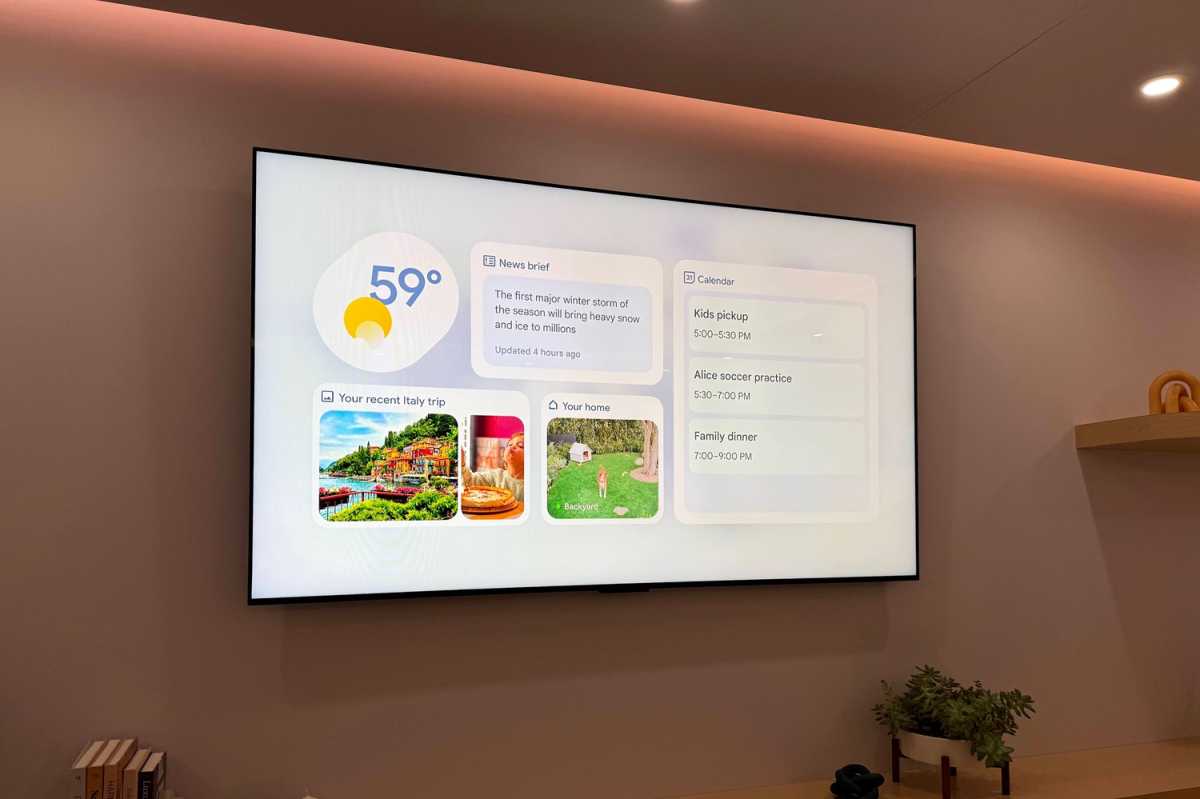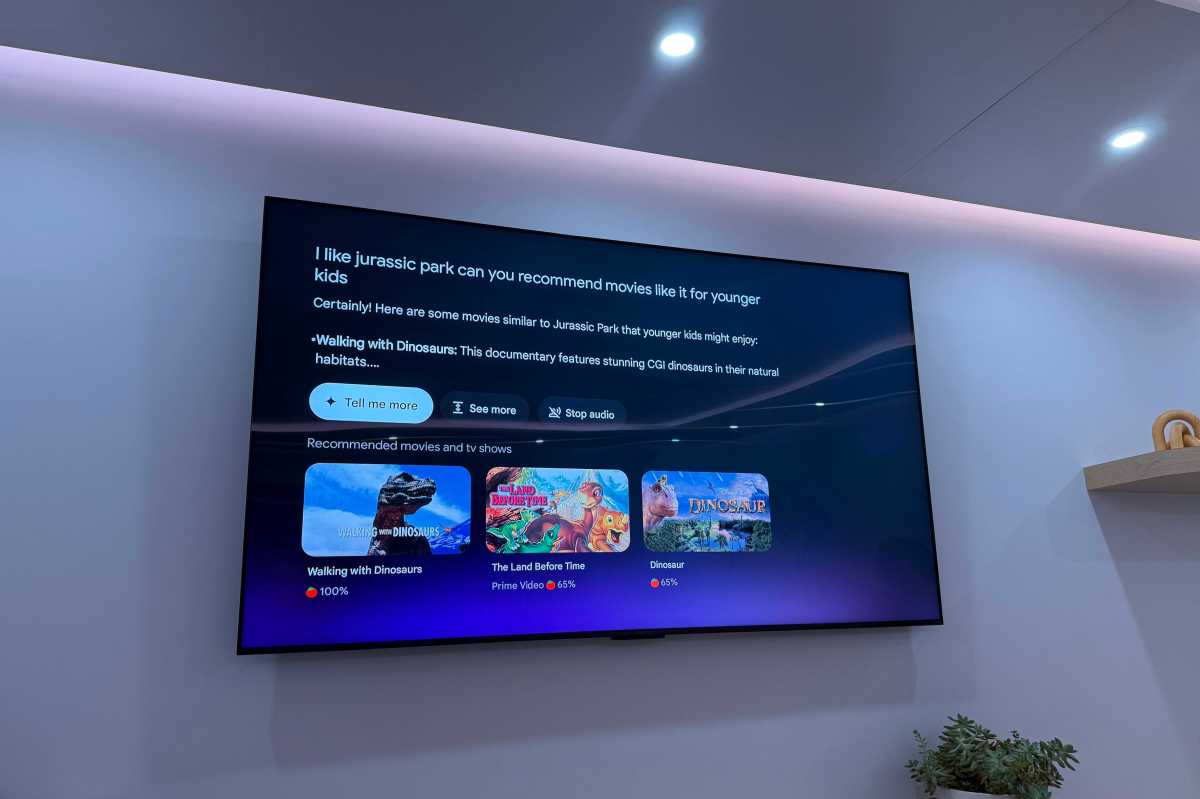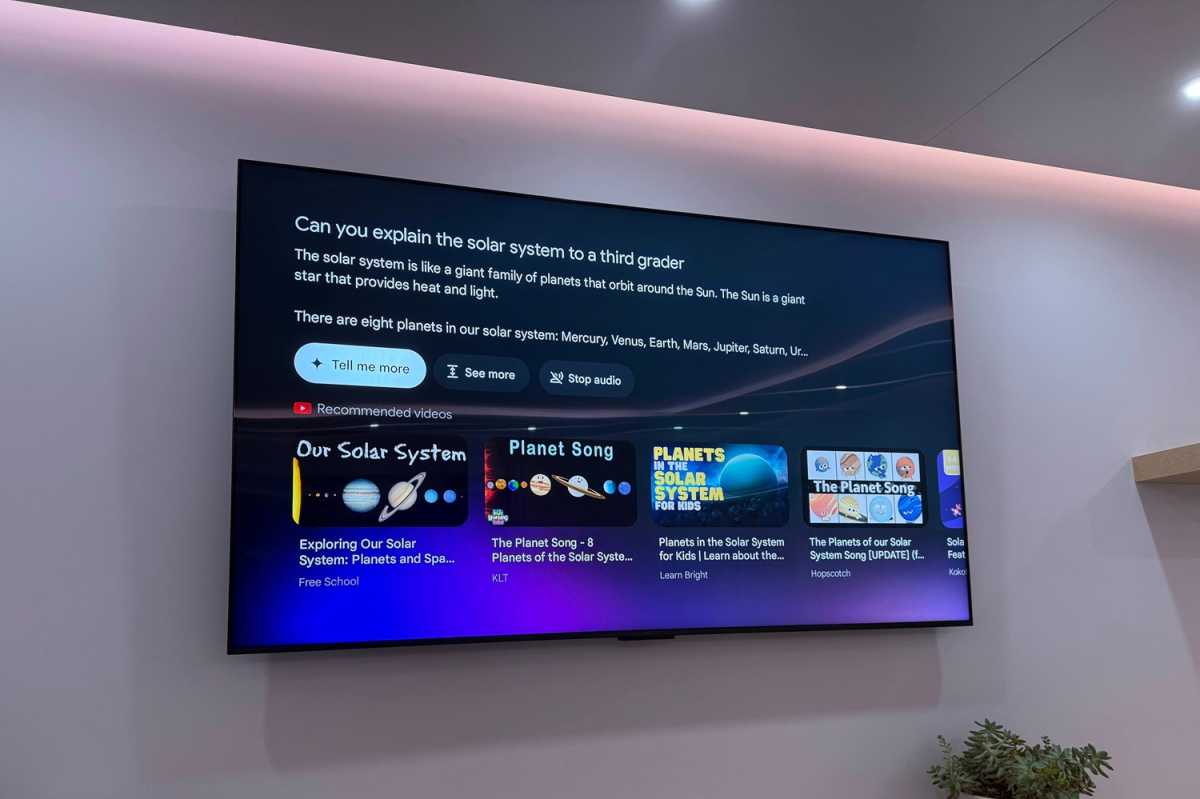Google is bringing its Gemini AI assistant to smart TVs in a bigger way this year, with the ultimate goal of getting people to pay for it in some way.
Several television makers plan to announce new Google TV sets with Gemini built in at CES this week. The smart TVs include far-field microphones that respond to “Hey Google” voice commands, and they’ll use proximity sensors to detect how far you’re standing from the TV, showing artwork from far away and an informational dashboard up-close.
Meanwhile, Gemini will begin handling some voice commands on TVs. This will allow for more nuanced movie and TV show requests, such as “suggest a movie like Jurassic Park, but suitable for young children.” It’ll also provide longer answers for certain types of knowledge queries, with suggested YouTube videos to match.
None of these features will cost extra when they start rolling out later this year, but Shalini Govil-Pai, Google’s GM & VP of TV, said the long-term plan is turn Gemini into something that merits a subscription, even on TVs.
“For us, our biggest goal is to create enough value that yes, you would be willing to pay for it,” she said.
Always-on TVs
Part of Google’s plan involves transforming the TV into an information hub.
The TVs shipping this year with proximity sensors will have a separate mode that turns on when you’re standing nearby. This informational mode will show the weather, top news stories, recent photos, and upcoming calendar events, akin to what you’d see on Google’s Nest Hub smart displays.

Jared Newman / Foundry
As you move further from the TV, it’ll switch to an art mode, similar to the existing Ambient mode on today’s Google TV devices. If you get far enough away, the TV will turn off entirely. TVs with these capabilities will start shipping toward the end of this year.
Google’s working on an AI-powered news briefing feature on TVs as well. When you say “Hey Google, play my news briefing,” Gemini will generate summaries of top stories, with a set of YouTube clips for each one.
“We believe TV is going to fundamentally change how information is consumed in the home,” Govil-Pai said.
Gemini on TV
Meanwhile, Google hopes that its Gemini AI will be more conducive to hands-free voice interaction.
If you’re looking for something to watch, for instance, Gemini will be able to handle more complex queries, such as “Bollywood movies that are similar to Mission Impossible.” It’s similar to the generative AI search feature that Amazon launched on Fire TV devices last year.

Jared Newman / Foundry
Gemini will also respond to certain general knowledge questions, like “explain the solar system to a third-grader.” Along with text and audio responses, Gemini will supply a list of YouTube videos to explore. Govil-Pai argued that putting these kinds of features on TVs will let people look up information in a more communal way.
“You don’t need to have a keyboard or a touchscreen in front of you anymore,” Govil-Pai says. “You can actually ask for things just using a natural paradigm that humans are used to.”

Jared Newman / Foundry
Putting it all together
While these features alone probably won’t warrant a paid subscription, they’re part of a larger ecosystem that Google is trying to build around Gemini, some elements of which already have subscriptions attached.
Last year, for instance, Google started bringing Gemini to its Nest smart speakers in a limited preview, but only for Nest Aware subscribers. It allows Nest camera users to look up camera motion events with natural queries, such as “what happened to the cookies on the counter,” and it also supports more complex information queries, such as “What’s the name of the song from Wicked where they’re dancing through the library?” Google won’t say whether it’ll open up Gemini to non-paying users on Nest speakers in the future.
Google’s working on bringing some Nest interactions to the TV as well. At CES, the company showed how the TV can turn on and show video when a Nest Doorbell camera detects motion. Users can then send a response to the door using “Hey Google” voice commands. Looking ahead, it’s not hard to imagine some kind of home Gemini subscription that ties all of these things together.
That said, all of this feels a bit like a solution in search of a problem. When I talk to readers about their streaming woes, they’re mainly concerned about figuring out where to watch their favorite shows while streamlining unnecessary subscriptions. Being able to ask one’s TV for vacation ideas or space facts is not high on the list of needs.
Google is wagering that we just need to start thinking bigger in how we use our TVs in the first place.
“People are not used to it, and so it will take some time for them to adapt to it,” Govil-Pai said, “but the use cases are so compelling that I believe this is the way things will start getting consumed in the next year or two.”
https://www.pcworld.com/article/2568513/google-hopes-youll-pay-for-an-ai-tv-assistant-someday.html
Accedi per aggiungere un commento
Altri post in questo gruppo


Many people underestimate the work needed to keep smartphones in tip-

We expect USB-C cables to perform a specific task: transferring eithe

Will Framework ever build a laptop based upon a Qualcomm Snapdragon p

After years of watching—and paying for—so-called “peak TV” on the lik

Framework’s modular, upgradeable laptops have made it a darling of PC

This Baseus charging station is pretty much all you need to have on y
